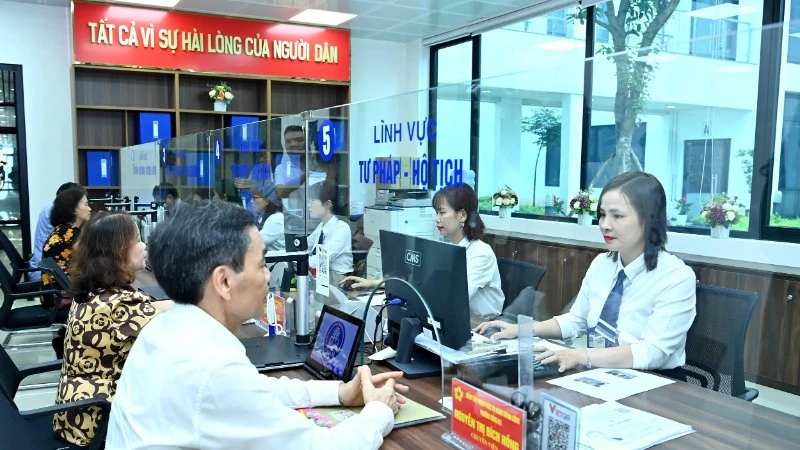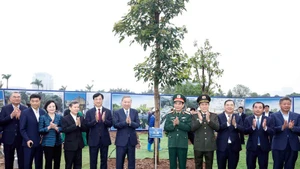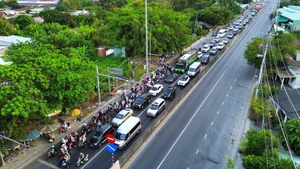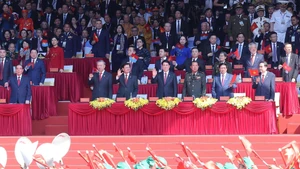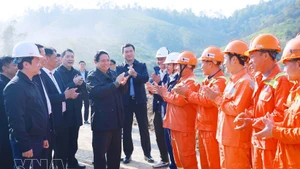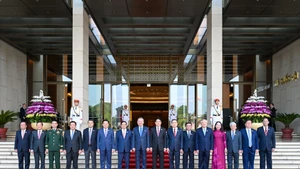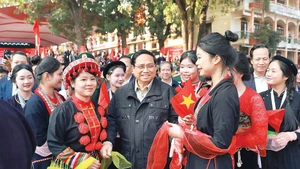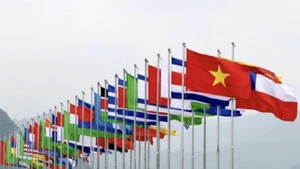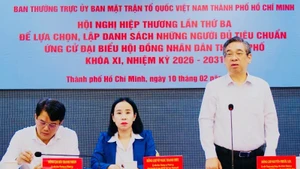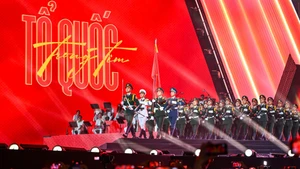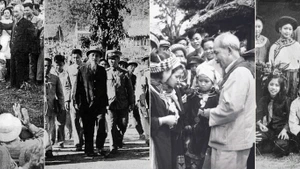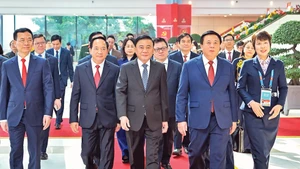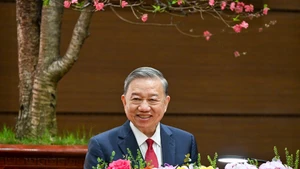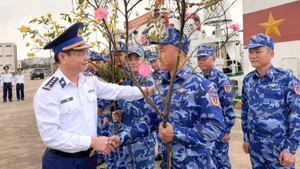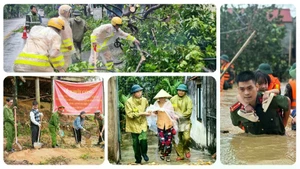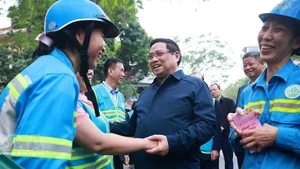Persistently striving to renew leadership methods with breakthrough thinking, the documents and resolutions produced are no longer “well-worn” or “stereotyped.” Instead, they bear the clear imprint of the Party’s intellect, political courage, and strategic vision in shaping guidelines and directions for leading the State and society.
The Party leads the State and society first and foremost through platforms, strategies, and policy orientations for national construction and development. Close engagement with realities, timely identification of bottlenecks and weak links in implementing resolutions, and the ability to forecast shifts and development requirements early and accurately form the foundation for renewing leadership methods and strengthening the leadership, governance, and combat capacity of grassroots Party organisations.
Breakthroughs from bottlenecks in strategy and resolution-making
The 6th National Party Congress (December 1, 1986) marked a crucial turning point and renewal in the Party’s leadership across all areas, initiating the comprehensive reform of the country, from renewing mindsets and organisational personnel to reforming leadership methods and working styles. Practice has proven that the Party’s leadership and activities have been the decisive factor behind the nation’s remarkable achievements in the renewal process. In leading this reform, the Party grew stronger, enhancing its leadership and governance capacity. The need to continuously reform leadership methods has been repeatedly emphasised in Party congress documents over the past 40 years.
The 6th National Party Congress (December 1, 1986) marked a crucial turning point and renewal in the Party’s leadership across all areas, initiating the comprehensive reform of the country, from renewing mindsets and organisational personnel to reforming leadership methods and working styles.
In Resolution No. 28-NQ/TW, dated November 17, 2022, on further renewing the Party’s leadership and governance methods for the political system in the new period, the Party Central Committee frankly acknowledged: some of the Party’s major guidelines and orientations were not institutionalised in a timely or sufficient manner, while others were institutionalised but proved unfeasible. The slow correction of issuing too many documents—some of which were vague, overlapping, and slow to be revised or replaced—has also been a persistent shortcoming in renewing the Party’s leadership methods.
With breakthrough thinking, during the drafting of documents for the 14th National Party Congress, at the 12th Plenum of the 13th Central Committee, the Party decided to integrate the contents of three separate reports (the Political Report, the Socio-Economic Report, and the Report on Party Building) into a single Political Report with a coherent, unified, and streamlined structure. This integration ensured both continuity and innovation, breaking through long-standing institutional bottlenecks in the process of formulating the Party’s guidelines and policies as reflected in the form and content of its resolutions.
Surveys from localities in recent years show that lower-level Party committees’ resolutions often tended to “mirror” those of higher levels, with a few additions for local context, resulting in overly lengthy, cumbersome documents that made dissemination and implementation more difficult and less effective. Draft political reports at Party congresses across most levels were rarely concise and focused; rather, they were generally long, covering every possible field. Consequently, when implemented, it was difficult to identify key programmes and tasks to concentrate resources on, leading to fragmented, scattered investment, stagnation, and inefficiency.
Many officials and Party members affirmed that the Central Committee’s decision this time—beyond simply integrating three reports—spread a spirit of renewal and breakthrough, moving away from “well-worn paths” and “stereotypes” in drafting congress documents and resolutions.
Nguyen Trung Thuc, a resident of Bac Kan Ward, Thai Nguyen Province, with 53 years of Party membership, shared: “Having observed many Party congresses, I find the Central Committee’s decision to integrate three reports very effective. The Political Report is now concise and focused, ensuring a comprehensive combination of socio-economic development and Party building. This allows us Party members to devote more time to in-depth study and provide more comprehensive and higher-quality contributions.”
Party member Phung Duc Kien, 60, from Dao Vien Ward, Bac Ninh Province, commented: “With this approach, the contents of the draft documents are condensed and non-redundant. The Political Report at the First Congress of the Dao Vien Ward Party Committee was also concise, with solutions focused on renewing leadership content and methods, building a clean and strong Party and political system, promoting the great national unity bloc, developing high-tech agriculture linked with building a modern, civilised urban area, and accelerating urbanisation. It was easy to follow and remember in implementation. This approach should continue in future congresses.”
Policies and resolutions closely aligned with real life
With a decisive and hands-on leadership style and persistent efforts to continue renewing leadership methods, over the past year—alongside drafting documents for the 14th National Party Congress—the Party Central Committee has consistently upheld the principle of promptly removing bottlenecks and constraints, while responding quickly, and effectively in a timely manner to difficult and unprecedented situations.
The Politburo’s rapid issuance of thematic resolutions on the development of science, technology, innovation, and national digital transformation; international integration in the new context; reforming lawmaking and law enforcement to meet the country’s development requirements in the new era; private-sector development; national energy security; breakthroughs in education and training; and key solutions to enhance the protection, care, and improvement of people’s health—has created the foundation for achieving development goals for the 2025–2030 term and the 2045 vision, while immediately responding to pressing demands of real life.
There have also been innovations in the thinking behind drafting and adopting resolutions.
There have also been innovations in the thinking behind drafting and adopting resolutions. The most evident breakthrough lies in the approach of implementing plans and projects “in advance and ahead of time,” thereby creating the basis for setting targets and solutions in each resolution. Life and policy, resolutions and practice, are no longer separate. The Party Central Committee’s key resolutions have been quickly institutionalised and incorporated into draft congress documents at all levels for the 2025–2030 term.
For instance, the policies of waiving tuition fees for students from preschool through high school, and investing in the construction of boarding schools combining primary and lower-secondary levels in 248 border communes, were approved and implemented by the Politburo even as it was still drafting the thematic resolution on breakthroughs in education and training. As General Secretary To Lam affirmed, these resolutions represent a swift transition from “adopting policy” to “governing implementation,” placing citizens and enterprises at the centre, with practical effectiveness as the benchmark.
During the drafting of the 14th National Party Congress documents, the Party Central Committee regularly updated new policies, and after each update and revision, the drafts were sent to grassroots Party organisations and Party congresses at all levels for feedback. Members of the Standing Editing Group, the Drafting Sub-Committee, the Party Charter Sub-Committee for the 14th Congress, and the Steering Committee for the 40-Year Doi Moi (Renewal) Review worked without days off, with urgency and dedication, ensuring the documents were concise, clear, easy to understand, easy to remember, and easy to implement.
At the request of the General Secretary, to ensure resolutions quickly become part of daily governance, the Party Central Committee has drafted an Action Programme to accompany the draft Political Report. This draft Action Programme sets out strategic tasks, schemes, projects, and initiatives for the 2026–2030 period, with clearly defined responsibilities, resources, timelines, and necessary conditions for implementation—providing a critical foundation for agencies and sectors to act within their assigned functions and authority.
When discussing the draft documents, many officials and Party members noted the innovation in the Party Central Committee’s leadership approach and were particularly impressed by the draft annex listing key tasks, schemes, projects, and works for 2026–2030, with a vision to 2045. The annex clearly specifies lead agencies, coordinating Party organisations, timelines, and resources. This list will continue to be updated up to the time of the 14th National Party Congress. Many tasks are already assigned for immediate and regular implementation, with some expected to be completed in the final months of the 13th Congress term.
In addition, many officials and Party members at grassroots levels said this approach helps overcome the long-standing phenomenon of leadership and directive documents being drafted mainly based on subjective assessments and top-down impositions from the “conference room” of some Party committees—leading in the past to resolutions that were often vague, generic, and lacking clarity in responsibility and resources for execution.
Party congresses at all levels and the 14th National Party Congress hold the responsibility of defining the vision, mindset, and strategic decisions for national and local development in the new era. Strengthening the leadership, governance, and combat capacity of grassroots Party organisations begins with improving the quality of draft congress documents at every level—ensuring they are grounded in solid political and scientific foundations, accurately reflect the laws of development in practice, and meet developmental demands. This embodies President Ho Chi Minh’s teaching: “Leadership must be democratic, practical, specific, and comprehensive. One must avoid leadership that is vague, one-sided, or general.”

